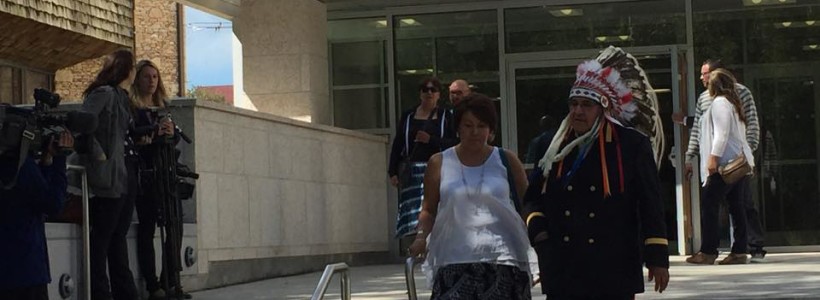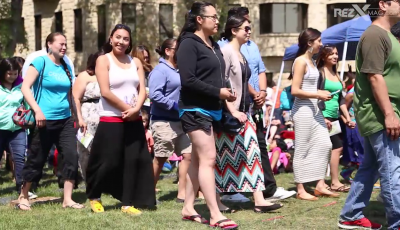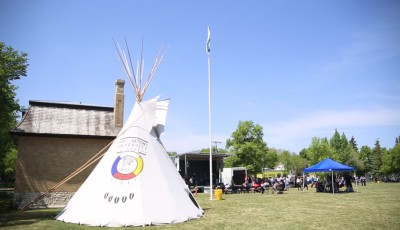COURT: Why Some Bands Are Refusing To Reveal Their Finances (+ First Nations have until midnight, Sept 1st or risk losing funding)
Saskatoon, SK – A couple weeks ago, five First Nations bands were in court defending themselves against the Federal Government for failing to comply with the recent First Nations Transparency Act (FNTA), which asks all bands to reveal their financial operations on-line. RezX talked to John Noon who was one of the councillors in attendance and asked him why they are defending themselves and what kind of affect this case could have on First Nations overall, win or lose?
RezX: So there are five bands defending themselves in court this week regarding the FNTA, can you tell us why they have chosen not to reveal their finances to the government?
John Noon: As someone who is attending court, the five specific bands each have specific issues but the main concern is “own source” revenue which is generated from band operations and not money from transfer agreements. Also, some parties have argued that this isn’t an issue of taxpayer money but money from fiduciary responsibilities of the treaties. Onion Lake, Thunderchild and Sawridge make financials available to their people
RezX: The First Nations bands in court (including AFN Chief Perry Bellegarde not in court, but made an appearance) have said that revealing finances of money that comes from First Nations Businesses will give their competition an unfair advantage, can you speak on that from how this is also a business matter in a competitive business industry?
John Noon: Band operations (companies) giving out finances to the public is problematic because competitors can use that info. It’s not expected from non-First Nations governments and this is problematic and this is where this case might see some leeway.
RezX: So what was the feeling in the court room this week so far, from the arguments on both sides, how do you feel these bands will do in court?
John Noon: Cases like this are decided at the Supreme Court level in some ways this is just another level so the bands are suspicious of the verdict which won’t be handed down right away. Government lawyers have not presented their defence but they will probably argue that First Nations were consulted and that 95-percent of First Nation’s have complied as opposed to the 5-percent here, and show extreme examples of Chief and Council salaries.
RezX: That’s a pretty huge number, 95% of bands complying, which also sets the precedence for a case like this for the 5% of bands fighting in court….in a way, do you feel like these bands are fighting for every First Nation in Canada, since the outcome could have a major impact?
John Noon: The judge has reiterated several times that this should’ve have been negotiated without court action. Some of those bands are able to withstand funding shortfalls and yes it seems that they are sticking up for the other First Nations as some bands have signed their agreements “under duress”. Some, meaning they were essentially forced to sign their agreements.
RezX: Kind of like how they forced Big Bear to sign treaties back in the day? (Not so much starving them, but threatening to starve these bands with no funding if they don’t sign?)
John Noon: What may be a fear is the government will use these financials to offload fiduciary responsibilities stating some First Nations are well off and don’t need funding. It’s exactly the same thing as BB (Big Bear).
John Noon has a BA (Bachelor of Arts) in Political Studies and is a Band Councillor who is attending the court proceedings. RezX will keep you informed with future news and outcomes of the case.
UPDATE: FIRST NATIONS BANDS HAVE UNTIL MIDNIGHT, SEPTEMBER 1st TO REVEAL THEIR FINANCES
In a recent story by CBC, these bands and others now have until Midnight, September 1st, to file their financial information to Aboriginal Affairs or risk losing funding for non-essential services. In the story, Dene National Chief Bill Erasmus, echoed the statements made by John Noon, saying, “”The monies that we’re talking about are not public funds, they’re not taxpayers’ dollars…This is why we’re adamant that this relationship is between the federal government, ourselves and our own citizens.”
Grand Chief Derek Nepinak (of the Assembly of Manitoba Chiefs) added, “The real story starts with asking why the Harper government felt it needed to create and unilaterally push a transparency law on indigenous communities who are already encumbered by the most punitive and stringent reporting requirements and standards of accountability under Canadian fiscal policy.”







